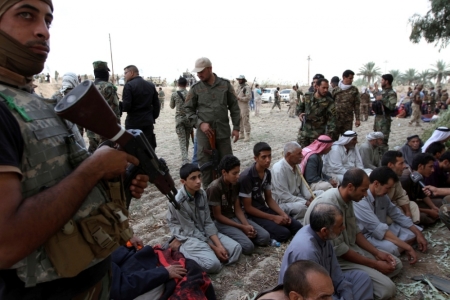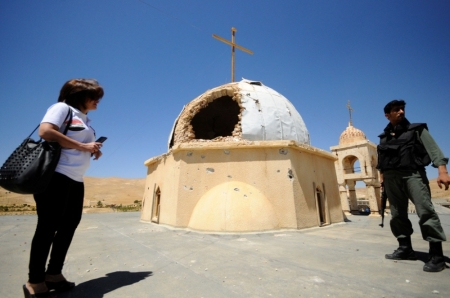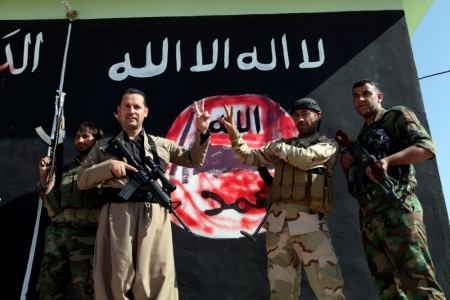ISIS Militants Plant Bombs Inside Villagers' Homes to Explode When They Return, Says Iraqi Christian Whose Town Was Captured

A Christian who was one of the last to flee his village in the Nineveh Province of northern Iraq before Islamic State jihadists captured it in August claims that ISIS militants are setting up explosives inside of homes so that if residents are ever to return to the village, their houses will explode upon entering.
The testimony of a Christian native named Ayad from Tel Keppe, a village just outside of the city of Mosul, was featured in a recent video interview conducted by the World Council of Churches. Ayad's testimony highlighted the timeline and details the of events that took place as the Islamic State militants captured his town on Aug. 6.
Ayad, who claims to be the last capable person to flee the village, said he eventually fled the town with no shoes on his feet, but emphasized that Christians are eager to return to their homes, as day by day, the Kurdish forces tell refugees what villages they have liberated and are safe to return to.
He shared that one man from his village was so eager to return, he went back to his house in Tel Keppe only to die at the hands of an ISIS explosive that was planted inside his home.

"Some of the houses in the village are burnt. Some are bombed and destroyed. Some are robbed. We heard of one man who tried to enter his house and as soon as he opened the door, the house exploded," Ayad said. "As ISIS forces leave, they are planting explosions inside the houses so that if people return they will be victims of blasts."
Ayad further explained that although he and other Christians can't wait to hear the news that their villages have been liberated by Peshmerga fighters, they are skeptical to return until they have a guarantee for safety.
He also said ISIS has planted explosives along the road from Tel Esqof to Tel Keppe, making the 10-kilometer journey back to his village almost impossible.
"As for the road to Tel Esqof to Tel Keppe, it is not safe," Ayad said. "We want to go back to our homes before winter. Where will we go when winter arrives?"
Ayad added that even before ISIS' emergence, Christians in the region have long been mistreated by Muslims. He stated emphatically that he and other Christians will not return to the region unless they are guaranteed "international protection" in their villages.

"We, all Christians, we miss our homes and villages but we can't go back without guarantees for security. We want international protection," he said. "Every time Muslims come they attack the Christians. What is [this] our fault? They rob Christians. They kill the Christians. They disrespect the Christians."
In recounting the seizure of his village, Ayad said that before ISIS entered the town, many of his Muslim neighbors "betrayed" the Christians in the town. He said his Arab neighbors took control of the town so that when ISIS arrived, they were able to completely seiz Tel Keppe in just over an hour. He added that there was no previous pressure on his neighbors to join ISIS, but they knew ISIS was coming because of the rocket attacks the town suffered the days before the seizure.
"The incidents can be described as betrayal," Ayad said. "The Arabs who were living in the province are the ones who took over the village at 9 p.m., then ISIS forces entered the province and occupied it at 10:30 p.m. When the local Arabs took over the city, they put the black ribbons around their heads and started shouting slogans supporting ISIS."
Ayad said even his own next-door neighbor turned on him.
"We lived for many years with our neighbors. My own neighbor was next to me for 16 years. We've shared weddings, condolences, food and drink together," Ayad said. "In the lapse of half an hour, he turned against me saying that I am a Nazarene (derogatory Arabic term for Christian), a non-believer. These are our neighbors who lived with us, and in half an hour they turned against us [Christians]."
In discussing the missile attacks that ISIS forces launched on the village the days before the village's seizure, Ayad said that one of the rockets landed right in between his house and the nuns' housing unit. He added that as the town's archdeacon tried to rescue the nuns from the building, a second blast in the area killed him.
When ISIS finally came into town with their "four military cars," Ayad said that the first thing they did was rip the crosses off of the village's church and replaced them with ISIS' black flags. He then explained that ISIS militants turned the church into the town's ISIS headquarters and the nuns' housing unit into the Islamic State community center.
Among the few villagers that remained after ISIS took control of the village was a 70-year-old man, who he claims ISIS militants beat and tortured because he refused to convert to Islam.





















